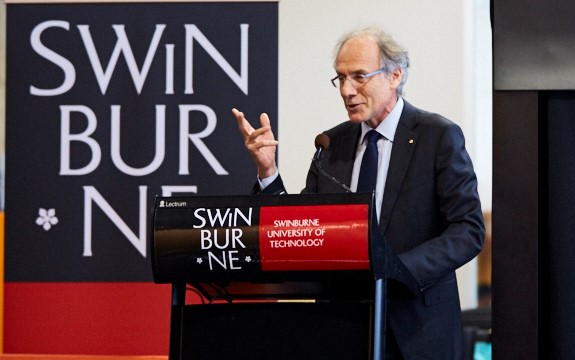Swinburne and CSIRO cement new partnership

In Summary
- Australia’s Chief Scientist, Dr Alan Finkel, calls for universities to act as engines of social change, preparing graduates to be job capable with the capacity to adapt to change
Well trained students adapt to the jobs that are available. They transfer their skills. They capitalise on their core knowledge
Australia’s Chief Scientist Alan Finkel, AO today called for universities to act as engines of social change, preparing graduates to be job capable with the capacity to adapt to change.
Dr Finkel was speaking at a special event in Swinburne University of Technology’s Factory of the Future to formally launch a new partnership between Swinburne and the CSIRO.
The Swinburne–CSIRO Strategic Research Alliance was announced in April 2016. It is focused on creating impact in industry, supporting economic growth in Australia and providing new opportunities for students.
Speaking to a gathering of industry leaders, Dr Finkel said the role of universities was not to predict the future but to train the people who make the future unpredictable.
“Which means that they have to be adaptable. Well trained students adapt to the jobs that are available. They transfer their skills. They capitalise on their core knowledge,” Dr Finkel said.
“We cannot know in detail what the jobs of tomorrow will require. What we offer is something worth having: the capacity to adapt to change – and the appetite to bring it about.
“We compare ourselves to Silicon Valley, but we need to look at the broader innovation landscape – of traditional as well as high-tech industries.
“We are not celebrating where we are innovative, for example, the Australian resource sector leads the world in iron ore extraction, and it is not just about profit. They have improved their environmental impact profile and safety profile through innovation.
“Another example is the banking sector. We are part of the cashless economy ahead of many other economies as well as tourism and agriculture.”
Dr Finkel called on universities to increase work integrated learning opportunities for students.
He also spoke of his plans to establish a research infrastructure roadmap and support the Australian Research Council to develop research impact measures.
Dr Finkel’s speech was followed by a panel discussion on manufacturing futures, workforce capacity and research collaboration featuring industry leaders:
• Jeff Connolly - CEO SIEMENS Australia and NZ
• Mike Edwards - General Manager, Boeing Research & Technology Australia
• Heidi Krebs - Co-owner & Director of Business Development, Cablex Pty Ltd
• Samantha Read – CEO, (Plastics & Chemicals Industries Association) PACIA
Swinburne-CSIRO partnership
“Swinburne and CSIRO have a long-standing relationship that is built on a commitment to excellence in science,” Professor Aleksandar Subic, Swinburne’s Deputy Vice-Chancellor (Research and Development), said.
“Our shared vision and belief in the transformative power of research and innovation through collaboration has brought us together; two like-minded organisations, bringing to bear our considerable complementary expertise on problems of national significance.
“This includes in particular areas of advanced manufacturing and materials, digital technologies, design and business innovation.”
“This commitment extends to our students as well. For example, our students engaged within the Swinburne Innovation Precinct will access the research internship program and accelerator program at CSIRO.”
From 2017 all Swinburne PhD students will have embedded within their research programs a foundation in entrepreneurship and innovation skills combined with real-world industry placement experience.
Executive Director of CSIRO’s Future Industries, Dr Anita Hill, said CSIRO and Swinburne share a similar philosophy and collaborative research culture that naturally supports them entering into a Strategic Research Alliance.
“This launch celebrates the connection between CSIRO’s Lab 22 and Swinburne’s Factory of the Future – both of which provide access to industry to help them move into the future of manufacturing and engage with high-tech R&D,” Dr Hill said.

